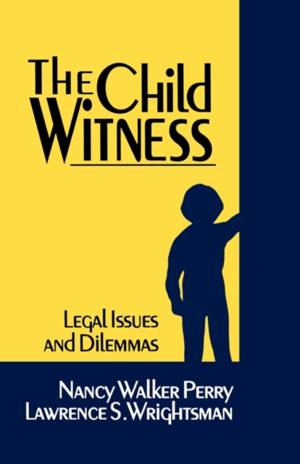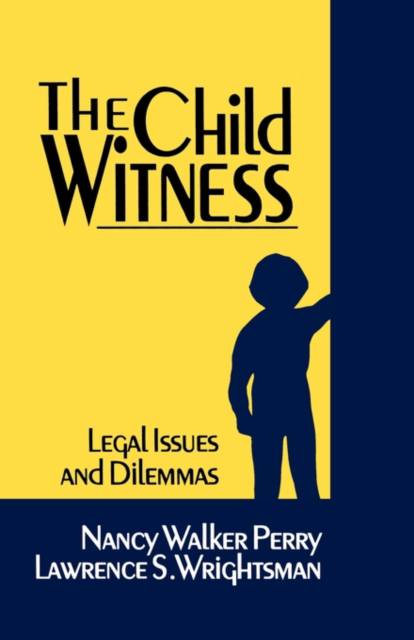
- Retrait gratuit dans votre magasin Club
- 7.000.000 titres dans notre catalogue
- Payer en toute sécurité
- Toujours un magasin près de chez vous
- Retrait gratuit dans votre magasin Club
- 7.000.0000 titres dans notre catalogue
- Payer en toute sécurité
- Toujours un magasin près de chez vous
The Child Witness
Legal Issues and Dilemmas
Nancy Walker Perry, Lawrence S Wrightsman
Livre broché | Anglais
160,45 €
+ 320 points
Description
Twenty years ago the issue of child sexual abuse was seldom discussed in the United States. Now reports of such abuses have become commonplace, and the arrests and trials of alleged abusers have become a staple of the evening television news reports. This recent onslaught of disclosures about children who report being sexually abused creates a dilemma for us all, but especially for social scientists and legal or service-delivery professionals who must make policy-oriented decisions concerning abused children. On the one hand we want to trust children; on the other, we must honor the rights of those accused of crimes. Furthermore, in our effort to protect children from subsequent abuse, we increasingly request that they testify in court about their traumatic experiences. What rights, if any, do children have to special treatment? Are they competent to testify? How will reliving their horrible experience in court affect their emotional well-being? And, how does the court balance the child′s needs with the right of the defendant to a fair trial? In The Child Witness Perry and Wrightsman provide an integrated, up-to-date review of social science research, legislation, and recent court decisions that relate to children as witnesses in court. Four central issues are addressed: children′s competence as witnesses, their credibility, the rights of children, and the rights of the accused. Recent research on issues of comprehension, memory, and the communication skills of children are evaluated as well as how different audiences--attorneys, judges, and jurors--perceive a child′s credibility. Replete with details from actual cases, The Child Witness provides policy recommendations and guidelines for judges, attorneys, and service-delivery professionals who work with children that are asked to testify in court. "The Child Witness is well organized and informative. Readers who seek basic skills in interviewing children will find that this book provides a window for understanding the challenge of gathering information from child witnesses. . . . The Child Witness merits reading by every professional social worker, attorney, minister, counselor, teacher, or psychologist whose young client is about to give testimony." --Families in Society: The Journal of Contemporary Human Services "This sobering glimpse of the costs and benefits of investigative interviewing sets the tone for a highly readable survey of psychology, law, and the child witness. . . . In addition to reviewing the law and psychology of child witnesses, Perry and Wrightsman also provide some useful pointers on how to interview children. . . . The Child Witness can be read with profit by all participants in the child sex abuse debate." --Child Abuse Review "The Child Witness effectively uses boxed highlights and summaries to present illustrative legal cases, definitions, and resource material. Instructors will find useful and exceptionally detailed outlines of the contents of each chapter. Finally, the coherance afforded by having only two authors enables The Child Witness to adhere closely to its stated organizational goals of explicating four key issues: child witness′ competency, child witness′ credibility, children′s legal rights and the rights of adult defendants in cases involving child witnesses." -- Candida Peterson, The Australian
Spécifications
Parties prenantes
- Auteur(s) :
- Editeur:
Contenu
- Nombre de pages :
- 304
- Langue:
- Anglais
Caractéristiques
- EAN:
- 9780803937727
- Date de parution :
- 01-05-91
- Format:
- Livre broché
- Format numérique:
- Trade paperback (VS)
- Dimensions :
- 145 mm x 215 mm
- Poids :
- 417 g

Les avis
Nous publions uniquement les avis qui respectent les conditions requises. Consultez nos conditions pour les avis.






